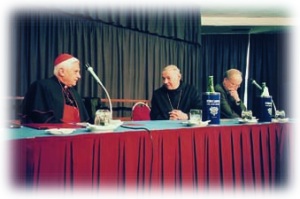 Jeg har i det siste lest flere ganger gjennom et kort foredrag kardinal Ratzinger holdt 24. oktober 1998; 10 år etter at at pave Johannes Pauls motu proprio om den tradisjonelle messen: Ecclesia Dei ble utgitt.
Jeg har i det siste lest flere ganger gjennom et kort foredrag kardinal Ratzinger holdt 24. oktober 1998; 10 år etter at at pave Johannes Pauls motu proprio om den tradisjonelle messen: Ecclesia Dei ble utgitt.
Jeg har forkortet foredraget noe og skal porsjonere det ut i fem deler, slik:
1 Den tradisjonelle liturgien etter 1988 – gleder og problemer.
2 Tolkingen av konsilet – ikke feil å fortsette med den tradisjonelle liturgien
3 Flere riter innen Kirken skaper ikke forvirring
4 Ulike matter å feire messen på – heller enn to ulike riter
5 Problemer med den tradisjonelle liturgien
Her er første del; det er flere ting å glede seg over mht den tradisjonelle liturgien etter 1988, men den møter fortsatt problemer flere steder:
The different communities born from the pontifical document – Ecclesia Dei – have given the Church a great number of priestly and religious vocations, zealous, joyful and profoundly united to the Pope, to serve the Gospel at this era in history, our era. Through them many faithful have been confirmed in their joy to be able to live the liturgy and in their love for the Church where may be they have found the two. In several dioceses -and their number is not so small- they serve the Church in collaboration with the Bishops and in a brotherly way with the faithful who feel at home in the renewed form of the new liturgy. All this cannot but urge us to gratitude today!
In many places difficulties persist and continue to persist, because bishops as well as priests and faithful consider this attachment to the ancient liturgy an element of division, which only troubles the ecclesial community and gives rise to suspicions about a conditional acceptance of the Council and more generally suspicion about obedience to the legitimate Pastors of the Church.
We must now ask the following question: how can these difficulties be overcome? How can one build the necessary confidence so that these groups and communities which love the ancient liturgy may be able to be integrated peacefully into the life of the Church? But there is another question underlying the first: What is the deep reason for this scorn or even refusal of the continuation of the ancient liturgical forms?
In this matter certainly, it is possible that reasons exist anterior to any theology – reasons which originate in the characters of individuals, which originate in the opposition of different characters or originate even other completely external circumstances. It is certain, however, that there are also more profound reasons which explain these problems.
Hele foredraget kan leses her.
